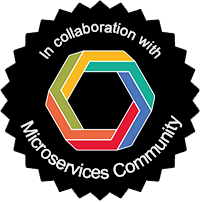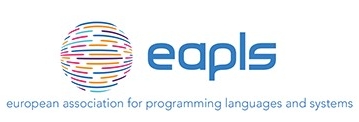COORDINATION 2021 - 23rd International Conference on Coordination Models and Languages
Coordination 2021 is one of the three conferences of DisCoTec 2021.
Keynote Speakers
- Gilles Fedak, iExec, FR
- Mira Mezini, Technical University of Darmstadt, DE
- Alexandra Silva, University College London, UK
List of accepted papers
The programme is available here.
The proccedings are published by Springer, LNCS 12717 (online version).
Scope
Modern information systems rely increasingly on combining concurrent, distributed, mobile, adaptive, reconfigurable and heterogeneous components. New models, architectures, languages and verification techniques are necessary to cope with the complexity induced by the demands of today’s software development. Coordination languages have emerged as a successful approach, in that they provide abstractions that cleanly separate behaviour from communication, therefore increasing modularity, simplifying reasoning, and ultimately enhancing software development. Building on the success of the previous editions, this conference provides a well-established forum for the growing community of researchers interested in models, languages, architectures, and implementation techniques for coordination.
Main topics of interest
Topics of interest encompass all areas of coordination, including (but not limited to) coordination related aspects of:
- Theoretical models and foundations for coordination: component composition, concurrency, mobility, dynamic, spatial and probabilistic aspects of coordination, logic, emergent behaviour, types, semantics;
- Specification, refinement, and analysis of architectures: patterns and styles, verification of functional and non-functional properties, including performance and security aspects;
- Dynamic software architectures: distributed mobile code, configuration, reconfiguration, networked computing, parallel, high-performance and cloud computing;
- Nature- and bio-inspired approaches to coordination;
- Coordination of multiagent and collective systems: models, languages, infrastructures, self-adaptation, self-organisation, distributed solving, collective intelligence and emerging behaviour;
- Coordination and modern distributed computing: web services, peer-to-peer networks, grid computing, context-awareness, ubiquitous computing, mobile computing;
- Coordination platforms for infrastructures of emerging new application domains like IoT, fog- and edge-computing;
- Programming methodologies, languages, middleware, tools, and environments for the development and verification of coordinated applications;
- Tools, languages and methodologies for secure coordination;
- Industrial relevance of coordination and software architectures: programming in the large, domain-specific software architectures and coordination models, case studies;
- Interdisciplinary aspects of coordination;
- Industry-led efforts in coordination and case studies.
Special topics
COORDINATION 2021 is seeking for contributions that enable the cross-fertilisation with other research communities in computer science or in other engineering or scientific disciplines.
Depending on the quality of the contributions, we plan to have dedicated sessions in the program, possibly together with a panel discussion.
-
Configurable Systems in the DevOps Era
Highly configurable software systems, such as software product lines, call for automatic mechanisms that allow to tame the complexity and variability. DevOps have pushed forward the importance of automating every step of the software development process, including the management of configurable systems. In this special topic, we welcome submissions addressing novel techniques and methodologies for the COORDINATION of automatic configuration tasks or for the COORDINATION of the various phases from development to deployment supporting the continuous release of software/products.
Moreover, given the relevance of the topic to industry and aligned with the main topics of COORDINATION, we encourage submissions of efforts carried out in collaboration with industry, including case studies.Contacts: Maurice ter Beek (maurice.terbeek@isti.cnr.it) and Hugo Torres Vieira (hugo.torres.vieira@ubi.pt)
-
Microservices (in collaboration with the Microservices Community)
Microservices are a novel architectural style, taking to an extreme the ideas of service oriented computing. In microservices, applications are composed by loosely coupled entities, the microservices. Beyond that, single microservices should be small enough to be easily managed, modified, and if needed removed and rewritten from scratch. Microservices aim at obtaining high flexibility, reconfigurability and scalability, thanks also to the exploitation of containerization technologies such as Docker. Given that microservice-based applications are composed by many loosely-coupled microservices, techniques allowing one to coordinate their execution in order to obtain the desired behaviour are of paramount importance.
Contacts: Ivan Lanese (ivan.lanese@unibo.it) and Larisa Safina (larisa.safina@inria.fr).
-
Techniques to reason about interacting digital contracts
With the rise of blockchains and cryptocurrencies, digital contracts have become popular in the form of smart contracts, which encode a financial transaction between possibly distrusting parties using a distributed consensus protocol. Although smart contracts bear the potential to benefit society quite fundamentally (e.g., equalize access to financial infrastructure, increase fairness), the benefits are shadowed by the existence of severe security vulnerabilities in deployed smart contracts and smart contract languages. In the 2021 edition of COORDINATION, we are soliciting contributions on new programming language paradigms and patterns for expressing digital contract interactions, verification and analysis techniques for checking safety and liveness properties and guaranteeing correctness of digital contracts, as well as compositionality and scalability of digital contract reasoning techniques.
Contacts: Stephanie Balzer (balzers@cs.cmu.edu) and Anastasia Mavridou (anastasia.mavridou@nasa.gov)
Tool papers
We welcome tool papers that describe experience reports, technological artefacts and innovative prototypes (including engines, APIs, etc.), for coordinating, modelling, analysing, simulating or testing systems, as well as educational tools in the scope of the research topics of COORDINATION. In addition, we welcome submissions promoting the integration of existing tools relevant to the community. Submissions to the tool track must include a tool paper and a link to a demo video that previews the potential tool presentation at the conference. Both the tool paper and the video will be decisive criteria in the selection process. Authors of accepted contributions will be able (and encouraged) to extend their tool paper to a (regular) full paper before appearance in the conference proceedings, which will be subject to a lightweight revision process.
Interested authors can contact the tool track chairs (Giorgio Audrito giorgio.audrito@unito.it, Silvia Lizeth Tapia Tarifa sltarifa@ifi.uio.no) for details.
Submissions
Dates
See the DisCoTec submission dates.
Publication
Authors are invited to submit papers electronically in PostScript or PDF using a two-phase online submission process. Registration of the paper information and abstract (max. 250 words) must be completed according to the DisCoTec submission dates. Submissions are handled through the EasyChair conference management system, accessible from the conference web site: https://easychair.org/conferences/?conf=coordination2021
Contributions must be written in English and report on original, unpublished work not submitted for publication elsewhere (cf. IFIP’s Author Code of Conduct, see http://www.ifip.org/ under Publications/Links). The submissions must not exceed the total page number limit (see below) prepared using Springer’s LNCS style. Submissions not adhering to the above specified constraints may be rejected without review.
Submission categories:
- Full papers (up to 15 pages + 2 pages references): describing thorough and complete research results and experience reports.
- Short papers (up to 6 pages + 2 pages references): describing research in progress or opinion papers on the past of Coordination research, on the current state of the art, or on prospects for the years to come.
- Survey papers (up to 25 pages + 2 pages references): describing important results and successful stories that originated in the context of COORDINATION.
- Tool papers (up to 6 pages + 2 pages references): describing technological artefacts in the scope of the research topics of COORDINATION. The paper must contain a link to a publicly downloadable MPEG-4 demo video of at most 10 minutes length.
ATTENTION: if you believe that your submission is related to one of the three special topics (Configurable Systems in the DevOps Era, Microservices, Techniques to reason about interacting digital contracts), then please indicate the name of the special topic as the first of the Author keywords in the onlinesubmission system.
The authors of accepted papers (in any submission category) will be encouraged to make their artefacts publicly available using permanent repositories such as Zenodo etc. (for Tool papers, the tool should already be available at submission time for reviewing purposes, but not necessarily via a permanent archive with a DOI).
The conference proceedings, formed by accepted submissions will be published by Springer in the LNCS Series.
Special Issues
Following the tradition of previous editions of COORDINATION, according to the quality and number of the submission, we will organise special issues of extended and selected Full/Short/Survey/Tool papers in reputable journals such as Logical Methods in Computer Science and Science of Computer Programming.
Submission Link
https://easychair.org/conferences/?conf=coordination2021
Program committee chairs
- Ferruccio Damiani (University of Turin, Italy)
- Ornela Dardha (University of Glasgow, UK)
Tool track chairs
- Giorgio Audrito (University of Turin, Italy)
- Silvia Lizeth Tapia Tarifa (University of Oslo, Norway)
Program committee
- Zena M. Ariola (University of Oregon, USA)
- Robert Atkey (University of Strathclyde, UK)
- Giorgio Audrito (University of Turin, Italy)
- Stephanie Balzer (CMU, USA)
- Maurice H. ter Beek (CNR-ISTI, Italy)
- Simon Bliudze (Inria Lille - Nord Europe, France)
- Laura Bocchi (University of Kent, UK)
- Roberto Casadei (Alma Mater Studiorum - Università di Bologna, Italy)
- Vashti Galpin (University of Edinburgh, UK)
- Fatemeh Ghassemi (University of Tehran, Iran)
- Elisa Gonzalez Boix (Vrije Universiteit Brussel, Belgium)
- Omar Inverso (Gran Sasso Science Institute, Italy)
- Jean-Marie Jacquet (University of Namur, Belgium)
- eva Kühn (Vienna University of Technology, Austria)
- Ivan Lanese (University of Bologna, Italy)
- Alberto Lluch Lafuente (DTU, Denmark)
- Michele Loreti (University of Camerino, Italy)
- Mieke Massink (CNR-ISTI, Italy)
- Anastasia Mavridou (NASA Ames Research Center, USA)
- Hernan Melgratti (Universidad de Buenos Aires, Argentina)
- Violet Ka I Pun (Western Norway University of Applied Sciences, Norway)
- Larisa Safina (Inria - Lille Nord Europe, France)
- Gwen Salaün (Université Grenoble Alpes, France)
- Meng Sun (Peking University, China)
- Vasco T. Vasconcelos (University of Lisbon, Portugal)
- Carolyn Talcott (SRI International, California, USA)
- Silvia Lizeth Tapia Tarifa (University of Oslo, Norway)
- Peter Thieman (Universität Freiburg, Germany)
- Hugo Torres Vieira (C4 - Universidade da Beira Interior, Portugal)
- Tarmo Uustalu (Reykjavik University, Iceland)
Steering committee
- Gul Agha (University of Illinois at Urbana Champaign, USA)
- Farhad Arbab (CWI and Leiden University, The Netherlands)
- Simon Bliudze (Inria Lille - Nord Europe, France)
- Laura Bocchi (University of Kent, UK)
- Wolfgang De Meuter (Vrije Universiteit Brussels, Belgium)
- Rocco De Nicola (IMT - School for Advanced Studies Lucca, Italy)
- Giovanna di Marzo Serugendo (Université de Genève, Switzerland)
- Tom Holvoet (KU Leuven, Belgium)
- Jean-Marie Jacquet (University of Namur, Belgium)
- Christine Julien (The University of Texas at Austin, USA)
- eva Kühn (Vienna University of Technology, Austria)
- Alberto Lluch Lafuente (Technical University of Denmark, Denmark)
- Michele Loreti (University of Camerino, Italy)
- Mieke Massink (ISTI CNR, Italy) - Chair
- José Proença (CISTER, ISEP, Portugal)
- Rosario Pugliese, Università di Firenze, Italy
- Hanne Riis Nielson, DTU, Denmark
- Marjan Sirjani (Mälardalen University, Sweden)
- Carolyn Talcott (SRI International, California, USA)
- Emilio Tuosto (Gran Sasso Science Institute, Italy)
- Vasco T. Vasconcelos (University of Lisbon, Portugal)
- Mirko Viroli (Alma Mater Studiorum - Università di Bologna, Italy)
- Gianluigi Zavattaro (Alma Mater Studiorum - Università di Bologna, Italy)


